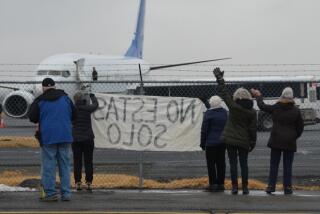Inner Tubes the Way Out for One of Lucky Ones
- Share via
Luis Figuredo Alejo, 34, arrived Friday at the processing center for Cuban refugees in downtown Miami, making him eligible for immediate resettlement because he arrived before the Administration imposed a detention policy. He had left Cuba on inner tubes Tuesday night. Through an interpreter, he told his story to Times researcher Edith Stanley:
“I am from Santa Domingo in Villa Clara, Cuba. I was a plumber, but there was not enough work. I couldn’t make a living. I have no family in Miami. I have 17 sisters and brothers in Cuba and a mother and father. I left my wife and 11-year-old son behind.
“I have wanted to come to the United States since I was 17. I was harassed by the government for ideological differences. I wanted to listen to Beatles music. I wanted to wear long hair.
“In 1980 I tried to come out with the Mariel boat lift. I wrote a letter to Raul Castro pleading my case. They denied my request because they said I was under military age and had not served military service.
“In 1981 I was drafted into the Army. I tried to make them think I was nuts. I threatened a captain with a loaded rifle. They didn’t consider me nuts but beat the hell out of me. After several more incidents, they put me in a hospital. They finally let me out of the Army for psychological reasons.
“After I came out of the army I went to school, where they tried to re-indoctrinate me to the Communist system. I refused.
“In 1993 I couldn’t take it any more. I got a raft made of two rubber tires and tried to make it off the island. I was captured by Cuban authorities. When their boat pulled beside my raft they tried to turn the raft over. Then they took me on board and the crew hit, pushed, and pulled my hair.
“I was held for 19 days in jail, but my lawyer got me off. He told the judge if there is no sail and no motor then I could have been fishing. He said I couldn’t leave the island without a sail or motor.
“After a person has tried to leave, and even if they are found not guilty, there is a stigma. I could not find a job. The only way I could survive was to work with the black market, which is widespread for food and commodities. It is the best way to survive.
“On Aug. 16th, a friend came to me because he knew I dealt with the black market. The friend wanted to know where to get an inner tube. When he told me what he wanted it for I said if you want to go, we go tonight. I had stolen two inner tubes from the government and had them hidden. At 11:30 or midnight on the 16th, four of us met at my house. We said we will go tonight.
“I told my wife and she said, ‘Row, and you will make it.’
“My wife said she would not come because she’s the only child and she doesn’t want to leave her mother behind. My son loves his mother and will stay with her.”
He took from a plastic bag his only possession, a worn color snapshot of himself kneeling beside his smiling blonde son. Tears came to his eyes as he shared the photo.
“We put the two tubes together with canvas cloth and left that night. All we had for power was oars. We brought supplies for four or five days. The only time I was scared was when we were in the port of Havana and a large ship was coming in. We were afraid the ship would run over us. He couldn’t possibly see us.
“We rowed eight hours and apparently caught the current. A fishing boat escaping with refugees found us about 27 miles out. They took us aboard. On the way over we passed a lot of others who could not get on board because they had reached the limit.
“About 40 miles out the Coast Guard rescued us. When we got to Key West they treated us very well. I am more than lucky to have arrived. I could have drowned. I could have been put in detention.”
More to Read
Sign up for Essential California
The most important California stories and recommendations in your inbox every morning.
You may occasionally receive promotional content from the Los Angeles Times.













